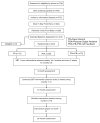SMART trial: A randomized clinical trial of self-monitoring in behavioral weight management-design and baseline findings
- PMID: 19665588
- PMCID: PMC2860431
- DOI: 10.1016/j.cct.2009.07.003
SMART trial: A randomized clinical trial of self-monitoring in behavioral weight management-design and baseline findings
Abstract
Background: The primary form of treatment for obesity today is behavioral therapy. Self-monitoring diet and physical activity plays an important role in interventions targeting behavior and weight change. The SMART weight loss trial examined the impact of replacing the standard paper record used for self-monitoring with a personal digital assistant (PDA). This paper describes the design, methods, intervention, and baseline sample characteristics of the SMART trial.
Methods: The SMART trial used a 3-group design to determine the effects of different modes of self-monitoring on short- and long-term weight loss and on adherence to self-monitoring in a 24-month intervention. Participants were randomized to one of three conditions (1) use of a standard paper record (PR); (2) use of a PDA with dietary and physical activity software (PDA); or (3), use of a PDA with the same software plus a customized feedback program (PDA + FB).
Results: We screened 704 individuals and randomized 210. There were statistically but not clinically significant differences among the three cohorts in age, education, HDL cholesterol, blood glucose and systolic blood pressure. At 24 months, retention rate for the first of three cohorts was 90%.
Conclusions: To the best of our knowledge, the SMART trial is the first large study to compare different methods of self-monitoring in a behavioral weight loss intervention and to compare the use of PDAs to conventional paper records. This study has the potential to reveal significant details about self-monitoring patterns and whether technology can improve adherence to this vital intervention component.
References
-
- Mokdad AH, Ford ES, Bowman BA, Dietz WH, Vinicor F, Bales VS, et al. Prevalence of obesity, diabetes, and obesity-related health risk factors, 2001. JAMA. 2003;289(1):76–9. - PubMed
-
- Mokdad AH, Serdula MK, Dietz WH, Bowman BA, Marks JS, Koplan JP. The continuing epidemic of obesity in the United States [Letters] JAMA. 2000 October 4;284(13):1650–1. - PubMed
-
- Wadden TA, Brownell KD, Foster GD. Obesity: responding to the global epidemic. J Consult Clin Psychol. 2002;70(3):510–25. - PubMed
-
- Ogden CL, Carroll MD, McDowell MA, Flegal KM. Obesity among adults in the United States — no Change since 2003–2004. National Center for Health Statistics; Hyattsville, MD: 2007.
-
- Klein S, Burke LE, Bray GA, Blair S, Allison DB, Pi-Sunyer X, et al. Clinical implications of obesity with specific focus on cardiovascular disease. A statement for professionals from the American Heart Association Council on Nutrition, Physical Activity, and Metabolism. Circulation. 2004;110:2952–67. - PubMed
Publication types
MeSH terms
Grants and funding
LinkOut - more resources
Full Text Sources
Other Literature Sources
Medical
Research Materials


